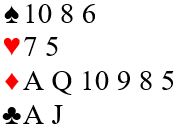You (South) have strength for an almost certain game in spades with good prospect for slam.
What is your call at 1st turn after bidding shown above?
Unfortunately, you cannot use the Jacoby 2NT game-forcing raise after East’s interference. I recommend you indicate a limit raise or better by cue bidding three clubs. Do not bid two hearts. It’s best to keep those nice hearts a secret from the opponents. Experts like Eddie Kantar always emphasize support with support.
That should be your highest priority with the known 9+ spade fit.
